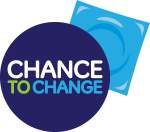Chance2Change: Development of a digital intervention to increase condom use amongst those self-testing for Chlamydia
Funder
Medical Research Council
Value
£145,000
Project team
Dr. Katie Newby, Coventry University
Dr. Julia Bailey, University College London
Dr. Rik Crutzen, Maastricht University
Dr. Katherine Brown, Coventry University
Professor Ala Szczepura, Coventry University
Jonny Hunt, Going off the rails
Tim Alston, Preventx Ltd
Dr. Catherine Lowndes, Public Health England
Dr. Tariq Sadiq, St George’s, University of London
Dr. Satyajit Das, Coventry and Warwickshire Partnership Trust

Project objectives
Young people are disproportionately affected by sexually transmitted infections (STIs). The best way to avoid STIs is to use a condom but young people report inconsistent use. A missed opportunity to intervene to increase condom use is when they access self-testing kits for STIs via the internet. Annually, approximately 130,000 young people are tested via this route. Those tested are at high risk of future STIs and include groups which other services have found difficult to engage. This study will develop a theory-based, tailored intervention to increase condom use, embedded within the existing user-pathway of the chlamydia self-testing website freetest.me.
Research impact
Ultimately we aim for our intervention to reduce the incidence of STIs. Untreated STIs can lead to serious health consequences such as pelvic inflammatory disease, ectopic pregnancy and infertility, which have a significant impact on quality of life. The estimated annual cost to the NHS of STI treatment is £620 million.
The intervention will initially be developed for freetest.me which tests approximately 1400 young people each week. There is however potential for it also to be adopted by other internet self-testing providers, the eSTI2 consortium (a project developing the technology and infrastructure to enable patients to self-diagnose STIs), and non-internet sexual health providers e.g. GUM patients could receive the intervention via an app whilst waiting in clinic for STI results. Potential ‘reach’ is therefore high.
We will be co-developing the intervention with three groups of six young people. This work will provide them with multiple opportunities to develop knowledge, experience and skills relating to sexual health, research, science and technology, and potentially to broaden their career horizons.
On completion, there will be a finalised version of the intervention. The team will publish three papers: 1) detailing the process of development and intervention content (determinants targeted, Behaviour Change Techniques (BCTs) and methods used, and proposed mechanisms of action), 2) identifying aspects of digital interventions that enhance usability and acceptability, and 3) a protocol for a feasibility study and full trial of the intervention - this will support submission of the next stage funding application.




